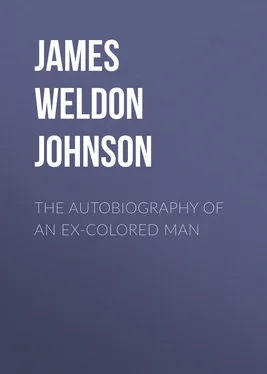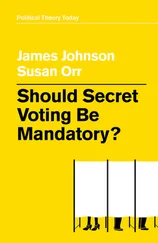James Weldon Johnson - The Autobiography of an Ex-Colored Man
Здесь есть возможность читать онлайн «James Weldon Johnson - The Autobiography of an Ex-Colored Man» — ознакомительный отрывок электронной книги совершенно бесплатно, а после прочтения отрывка купить полную версию. В некоторых случаях можно слушать аудио, скачать через торрент в формате fb2 и присутствует краткое содержание. Жанр: foreign_prose, foreign_antique, на английском языке. Описание произведения, (предисловие) а так же отзывы посетителей доступны на портале библиотеки ЛибКат.
- Название:The Autobiography of an Ex-Colored Man
- Автор:
- Жанр:
- Год:неизвестен
- ISBN:нет данных
- Рейтинг книги:3 / 5. Голосов: 1
-
Избранное:Добавить в избранное
- Отзывы:
-
Ваша оценка:
- 60
- 1
- 2
- 3
- 4
- 5
The Autobiography of an Ex-Colored Man: краткое содержание, описание и аннотация
Предлагаем к чтению аннотацию, описание, краткое содержание или предисловие (зависит от того, что написал сам автор книги «The Autobiography of an Ex-Colored Man»). Если вы не нашли необходимую информацию о книге — напишите в комментариях, мы постараемся отыскать её.
The Autobiography of an Ex-Colored Man — читать онлайн ознакомительный отрывок
Ниже представлен текст книги, разбитый по страницам. Система сохранения места последней прочитанной страницы, позволяет с удобством читать онлайн бесплатно книгу «The Autobiography of an Ex-Colored Man», без необходимости каждый раз заново искать на чём Вы остановились. Поставьте закладку, и сможете в любой момент перейти на страницу, на которой закончили чтение.
Интервал:
Закладка:
One day a couple of weeks after my father had been to see us, a wagon drove up to our cottage loaded with a big box. I was about to tell the men on the wagon that they had made a mistake, when my mother, acting darkly wise, told them to bring their load in; she had them unpack the box, and quickly there was evolved from the boards, paper, and other packing material a beautiful, brand-new, upright piano. Then she informed me that it was a present to me from my father. I at once sat down and ran my fingers over the keys; the full, mellow tone of the instrument was ravishing. I thought, almost remorsefully, of how I had left my father; but, even so, there momentarily crossed my mind a feeling of disappointment that the piano was not a grand. The new instrument greatly increased the pleasure of my hours of study and practice at home.
Shortly after this I was made a member of the boys' choir, it being found that I possessed a clear, strong soprano voice. I enjoyed the singing very much. About a year later I began the study of the pipe organ and the theory of music; and before I finished the grammar school, I had written out several simple preludes for organ which won the admiration of my teacher, and which he did me the honor to play at services.
The older I grew, the more thought I gave to the question of my mother's and my position, and what was our exact relation to the world in general. My idea of the whole matter was rather hazy. My study of United States history had been confined to those periods which were designated in my book as "Discovery," "Colonial," "Revolutionary," and "Constitutional." I now began to study about the Civil War, but the story was told in such a condensed and skipping style that I gained from it very little real information. It is a marvel how children ever learn any history out of books of that sort. And, too, I began now to read the newspapers; I often saw articles which aroused my curiosity, but did not enlighten me. But one day I drew from the circulating library a book that cleared the whole mystery, a book that I read with the same feverish intensity with which I had read the old Bible stories, a book that gave me my first perspective of the life I was entering; that book was Uncle Tom's Cabin .
This work of Harriet Beecher Stowe has been the object of much unfavorable criticism. It has been assailed, not only as fiction of the most imaginative sort, but as being a direct misrepresentation. Several successful attempts have lately been made to displace the book from Northern school libraries. Its critics would brush it aside with the remark that there never was a Negro as good as Uncle Tom, nor a slave-holder as bad as Legree. For my part, I was never an admirer of Uncle Tom, nor of his type of goodness; but I believe that there were lots of old Negroes as foolishly good as he; the proof of which is that they knowingly stayed and worked the plantations that furnished sinews for the army which was fighting to keep them enslaved. But in these later years several cases have come to my personal knowledge in which old Negroes have died and left what was a considerable fortune to the descendants of their former masters. I do not think it takes any great stretch of the imagination to believe there was a fairly large class of slave-holders typified in Legree. And we must also remember that the author depicted a number of worthless if not vicious Negroes, and a slave-holder who was as much of a Christian and a gentleman as it was possible for one in his position to be; that she pictured the happy, singing, shuffling "darky" as well as the mother wailing for her child sold "down river."
I do not think it is claiming too much to say that Uncle Tom's Cabin was a fair and truthful panorama of slavery; however that may be, it opened my eyes as to who and what I was and what my country considered me; in fact, it gave me my bearing. But there was no shock; I took the whole revelation in a kind of stoical way. One of the greatest benefits I derived from reading the book was that I could afterwards talk frankly with my mother on all the questions which had been vaguely troubling my mind. As a result, she was entirely freed from reserve, and often herself brought up the subject, talking of things directly touching her life and mine and of things which had come down to her through the "old folks." What she told me interested and even fascinated me, and, what may seem strange, kindled in me a strong desire to see the South. She spoke to me quite frankly about herself, my father, and myself: she, the sewing girl of my father's mother; he, an impetuous young man home from college; I, the child of this unsanctioned love. She told me even the principal reason for our coming north. My father was about to be married to a young lady of another great Southern family; She did not neglect to add that another reason for our being in Connecticut was that he intended to give me an education and make a man of me. In none of her talks did she ever utter one word of complaint against my father. She always endeavored to impress upon me how good he had been and still was, and that he was all to us that custom and the law would allow. She loved him; more, she worshiped him, and she died firmly believing that he loved her more than any other woman in the world. Perhaps she was right. Who knows?
All of these newly awakened ideas and thoughts took the form of a definite aspiration on the day I graduated from the grammar school. And what a day that was! The girls in white dresses, with fresh ribbons in their hair; the boys in new suits and creaky shoes; the great crowd of parents and friends; the flowers, the prizes and congratulations, made the day seem to me one of the greatest importance. I was on the program, and played a piano solo which was received by the audience with that amount of applause which I had come to look upon as being only the just due of my talent.
But the real enthusiasm was aroused by "Shiny." He was the principal speaker of the day, and well did he measure up to the honor. He made a striking picture, that thin little black boy standing on the platform, dressed in clothes that did not fit him any too well, his eyes burning with excitement, his shrill, musical voice vibrating in tones of appealing defiance, and his black face alight with such great intelligence and earnestness as to be positively handsome. What were his thoughts when he stepped forward and looked into that crowd of faces, all white with the exception of a score or so that were lost to view? I do not know, but I fancy he felt his loneliness. I think there must have rushed over him a feeling akin to that of a gladiator tossed into the arena and bade to fight for his life. I think that solitary little black figure standing there felt that for the particular time and place he bore the weight and responsibility of his race; that for him to fail meant general defeat; but he won, and nobly. His oration was Wendell Phillips's "Toussaint L'Ouverture," a speech which may now be classed as rhetorical—even, perhaps, bombastic; but as the words fell from "Shiny's" lips their effect was magical. How so young an orator could stir so great enthusiasm was to be wondered at. When, in the famous peroration, his voice, trembling with suppressed emotion, rose higher and higher and then rested on the name "Toussaint L'Ouverture," it was like touching an electric button which loosed the pent-up feelings of his listeners. They actually rose to him.
I have since known of colored men who have been chosen as class orators in our leading universities, of others who have played on the varsity football and baseball teams, of colored speakers who have addressed great white audiences. In each of these instances I believe the men were stirred by the same emotions which actuated "Shiny" on the day of his graduation; and, too, in each case where the efforts have reached any high standard of excellence they have been followed by the same phenomenon of enthusiasm. I think the explanation of the latter lies in what is a basic, though often dormant, principle of the Anglo-Saxon heart, love of fair play. "Shiny," it is true, was what is so common in his race, a natural orator; but I doubt that any white boy of equal talent could have wrought the same effect. The sight of that boy gallantly waging with puny, black arms so unequal a battle touched the deep springs in the hearts of his audience, and they were swept by a wave of sympathy and admiration.
Читать дальшеИнтервал:
Закладка:
Похожие книги на «The Autobiography of an Ex-Colored Man»
Представляем Вашему вниманию похожие книги на «The Autobiography of an Ex-Colored Man» списком для выбора. Мы отобрали схожую по названию и смыслу литературу в надежде предоставить читателям больше вариантов отыскать новые, интересные, ещё непрочитанные произведения.
Обсуждение, отзывы о книге «The Autobiography of an Ex-Colored Man» и просто собственные мнения читателей. Оставьте ваши комментарии, напишите, что Вы думаете о произведении, его смысле или главных героях. Укажите что конкретно понравилось, а что нет, и почему Вы так считаете.












